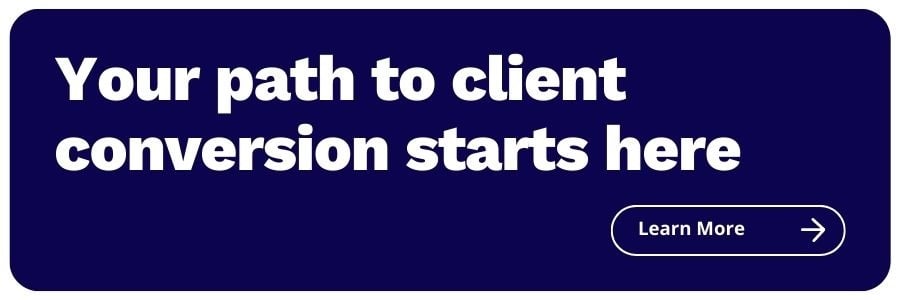9 Sales Habits of Highly Successful Firm Owners
Share this
Sales professionals have long had a reputation for being pushy, overbearing, and misleading. But not all those who “do sales” are created equal. The most successful sales professionals are the ones who don't seem like salespeople at all.
Being authentic, building real relationships, and showing prospects how you can help them achieve their goals will transform your role from salesperson to guide.
Most often, prospective clients won’t be ready to buy the first time they engage or interact with you. Just like you wouldn’t propose marriage on the first date, you wouldn’t ask someone to dive headfirst into a financial planning relationship with you upon your first interaction.
You need to artfully guide potential clients on their journey from prospect to customer. With a few key habits, you can do just that.
Habit #1: Follow A Process
Processes not only help keep everything moving along smoothly, but they also create a better experience for prospects and clients. A sales process will outline the different stages through which a prospect will pass as they eventually become a client.
Take time to list out the different touch points throughout this process and determine the average amount of time it takes a prospect to advance from stage to stage, from initial inquiry to qualified prospect to closed new client.
Here are some things to consider when creating this process:
-
How will you find clients?
-
How will you screen prospects to determine if they are the right fit for you and your firm?
-
What will your meetings look like and what will you cover?
-
When will you follow up and how will you track client loyalty information?
-
When will you reach out with various touchpoints? (e.g. birthdays, anniversaries)
Processes can often feel mechanized, but your sales process needs to be as humanized as possible. As you create your sales process, incorporate some personal touches. Never underestimate the power of a handwritten note or card, and don’t be afraid to think outside the box.
I once knew an individual who sent 4th of July cards instead of the typical holiday cards. Why? Because NO ONE sends 4th of July cards. But around the holidays, everyone is bombarded with cards and they often get tossed after a quick glance. A 4th of July card, on the other hand, stands out.
Get creative on how and when you will stay in touch with your prospects.
Habit #2: Know Your Ideal Client
We’ve said it multiple times, and we’ll say it again: you need a niche. This is especially important to be successful in sales.
So, what is your niche? Said another way, who is your ideal client? If you can't answer this question, you aren't ready to start selling your services.
When you are just starting out, you might believe that everyone you talk to should become a client. This couldn’t be further from the truth. If you try to bring everybody into the fold, you won’t end up with more clients—you’ll end up wasting your time.
Instead, you should focus your energy on bringing qualified prospects who have a high probability of becoming clients into your funnel.
To do this, you must know who your ideal client is and how you can support them. Start by determining the type of clients you don’t want to work with. Then start figuring out the attributes of the clients you do want to work with. What are their occupations, hobbies, values, and age range?
Keep working through questions like these and soon enough you’ll have a niche to focus on. When you understand who your ideal client is, you’ll have a better understanding of how to successfully market to and work with this client.
By focusing on a specific niche, you’ll have a good feel for what your prospects respond to and what makes them tick, and what they don't want or need.
You’ll also be able to effectively leverage the power of inbound marketing, which will showcase your talents, expertise, and offerings to bring people who are genuinely interested in working with you into your world.
Remember, your ideal client—your niche—can always grow and evolve. Nothing is set in stone.
Habit #3: Know When to Move On
This ties right into finding your ideal client. Not every prospect is the right fit for you and it is okay to be picky.
Rather than chasing someone who won’t be a good fit for your business, say no and move on.
Saying no to those that aren’t a good fit for your business is one of the best things you can do. Why? Because in the end, it will save you time and frustration. Often the people who aren’t the best fit require the most work.
But that doesn’t mean you have to turn them away empty-handed. Find a few peers to whom you can refer business when someone isn’t a great match for you. Creating connections within your industry and inner circle is a great way to have referrals sent your way too.
Habit #4: Learn to Listen
Know when to stop talking and just listen. If you spend the whole meeting talking about yourself and what you have to offer, your prospect won’t be interested. This is about them, after all.
Give your prospect the time and space to talk. I always like to turn the meeting over to a prospect first. This gives them an opportunity to tell me about their background and what they are interested in learning more about, and essentially provides a framework for the rest of the meeting.
Let your prospect be your guide. What is important to one person may not be as important to someone else. If given the opportunity, your prospect will tell you what they want to know more about. Then you can build your agenda from there. This helps form an authentic relationship and build trust from the start.
Habit #5: Take Notes, Follow Up, and Set Expectations
If I had a meeting with you that required a follow-up email, and then you never received that email, would you feel important or valued? Probably not.
Don’t do this to your prospects. Capture notes from your meetings, including key details, concerns, and any follow-up that needs to be sent after the meeting… and then be sure to actually deliver on that promised follow-up.
Also be sure to set the expectation at the end of the meeting on when you will send over any follow-up. Maybe your goal is to send it out in under 24 hours, which is fine. But your prospect may not know that and be expecting it a lot sooner. Set the expectation from the start and it will help avoid any confusion.
And make sure you actually capture this data, whether you handwrite it in a notebook or type notes on a computer during the meeting. There is nothing more embarrassing than having to ask someone for information they already gave you.
Habit #6: Keep Your Promises
Breaking promises or providing false information is incredibly damaging to your reputation and relationship with prospects. If you don’t know the answer to something, it is okay to say that. This is much better than offering an “answer” that isn’t true.
Instead, be honest that you don’t know, and make a promise to find out the answer. Then be sure to actually follow up with that answer afterward.
Your prospect would much prefer that you are honest and upfront rather than distrustful and just plain wrong, which calls your expertise into question. Being truthful from the start and following through nurtures a positive relationship with your prospects.
Habit #7: Never Stop Learning
Being an “expert” is a never-ending endeavor. There will always be room to learn and grow.
Actively seek opportunities to learn more about the industry and your field of focus. Take classes, study for a new certification, or shadow a peer.
There are so many ways to take your business to the next level. Always seek to understand what your prospects need from you, and then provide it. People feel most supported when their needs are understood and met.
Habit #8: Be Prepared
“By failing to prepare you are preparing to fail.” - Benjamin Franklin
How true is that?
Give yourself adequate time to prepare for meetings. Most people don't succeed by walking into a meeting and winging it. Preparation is the key to your success.
Being prepared for meetings can help you anticipate the types of questions that may arise, which will reduce the number of times you fumble over an answer or have to say “I don’t know” (which again is okay from time to time, but should not be the norm). You’ll feel more comfortable knowing you aren’t walking into a situation blindly.
Give yourself at least 30 minutes in the morning to review your scheduled meetings for the day or give yourself some buffer time in between meetings to prepare.
In our digital world, you can do a lot of research on someone before you even meet them for the first time. Do a quick Google search or a search on social channels to learn more about a prospect before you meet with them. Use your findings to your advantage and to personalize the meeting and speak to a prospect's interests (don't make it apparent that you did some super internet sleuthing ahead of time—you don't want to come off as creepy).
And remember, always make a good impression, whether it is the first meeting or the fifth. We all have bad days, but this isn’t something your prospect or client needs to see. Find a way to shake things off before heading into a meeting, whether that means getting out of the office for a minute or taking some deep breaths.
You are the voice of your firm at all times, on good days and bad; just because you had a great first conversation doesn’t mean you have to try any less hard to impress the second or third or thirtieth time you talk.
Habit #9: Be Passionate
Last but certainly not least, be passionate about the service(s) you are selling!
Passion draws people in. If you aren’t enthusiastic about what you have to offer, then no one else will be either. As a financial planner, you have the real opportunity to make a difference in the lives of others.
Financial planning is first and foremost a helping profession. Never forget that! The most successful sales professionals genuinely want to help people and bring value to their lives.
Your goal is to build solid relationships by understanding what your prospects need, answering the questions that will help them make a buying decision, and then helping them achieve their goals. What could be more gratifying than helping someone else live their best life? If that's not something to be passionate about, I don't know what is.
When you’re in the thick of firm ownership, bogged down with the less rewarding minutiae, and perhaps struggling to feel the passion that inspired you to start your own firm in the first place, take a moment to reflect on and celebrate your clients’ successes. This will help reignite your passion.
There is nothing better than seeing your clients succeed, so take these opportunities to celebrate. Use these success stories to stay connected to and passionate about the important work you are doing.
A sales process is just one of many processes you will need to establish as a firm owner, and as such, it’s easy to push it to the back burner. But you shouldn’t. Your sales process directly impacts your overall success. So take the time to hone the habits above and become not just a successful sales professional, but a successful firm owner.
 About the Author
About the Author
Lindsey Harrington is known as the Growth Guru at XYPN, helping prospective members learn more about membership and what it takes to join our growing community. She is passionate about sharing the tools and resources the community has to offer to help individuals start, run, and grow their own fee-only financial planning practices.
Share this
- Fee-only advisor (381)
- Advice (305)
- Business Development (248)
- Independent Financial Advisor (203)
- Growing Your Firm (161)
- Marketing (133)
- Financial Planning (129)
- What Would Arlene Say (WWAS) (81)
- Business Coach (80)
- Firm Ownership (78)
- Training (75)
- Compliance (72)
- Business (69)
- Building Your Firm (65)
- Financial Advisors (63)
- Online Marketing (61)
- Events (59)
- Starting a Firm (52)
- Staffing & HR (49)
- Technology (49)
- From XYPN Members (48)
- Launching a firm (46)
- Advisors (41)
- Entrepreneurship (38)
- Taxes (37)
- Networking & Community (33)
- Interviews and Case Studies (32)
- Investment Management (31)
- Sales (27)
- Social Responsibility (27)
- Tax Preparation (27)
- XYPN Invest (26)
- Business Owner (25)
- Small Business Owner (20)
- Financial Management & Investment (19)
- Industry Trends & Insights (19)
- Financial Education (17)
- Financial Planners (17)
- Independent Financial Planner (17)
- Tech Stack (17)
- XYPN (17)
- Leadership & Vision (16)
- Investing (15)
- Niche (15)
- How to be a Financial Advisor (14)
- NextGen (14)
- RIA (14)
- Media (13)
- Preparing to Launch (13)
- Press Mentions (13)
- RIA Operations (12)
- RIA Owner (12)
- XYPN Membership (12)
- Assets Under Management (AUM) (11)
- First Year (11)
- Goals (11)
- Scaling (10)
- Advisor Success (9)
- Building Your Firm (8)
- Communication (8)
- Lessons (8)
- Study Group (8)
- Time Management (8)
- Virtual Advisor (8)
- Behavioral Finance (7)
- Growth (7)
- Pricing Models (7)
- From Our Advisors (6)
- Independent RIA (6)
- Money Management (6)
- Motivation (6)
- Processes (6)
- Automation (5)
- Broker-Dealers (5)
- College Planning (5)
- Filing Status (5)
- How I Did It series (5)
- Investment Planner (5)
- Mental Health (5)
- Michael Kitces (5)
- Preparing to Launch (5)
- RIA Operations (5)
- Retirement (5)
- Risk and Investing (5)
- S Corpration (5)
- Support System (5)
- TAMP (5)
- Wealth (5)
- Year-End (5)
- Client Services (4)
- Outsourcing (4)
- Selling a Firm (4)
- Succession Plans (4)
- Benchmarking Study (3)
- Budgeting (3)
- Career Changers (3)
- Engagement (3)
- Fiduciary (3)
- Getting Leads (3)
- Membership (3)
- Millennials (3)
- Monthly Retainer Model (3)
- Partnership (3)
- Pricing (3)
- Recordkeeping (3)
- Risk Assessment (3)
- Small Business (3)
- Staying Relevant (3)
- Work Life Balance (3)
- Advice-Only Planning (2)
- Bookkeeping (2)
- Charitable Donations (2)
- Client Acquisition (2)
- Differentiation (2)
- Health Care (2)
- IRA (2)
- Inflation (2)
- Productivity (2)
- Implementing (1)
Subscribe by email
You May Also Like
These Related Stories

14 Sales Hacks for Independent Financial Advisors

Craft a Compelling Value Proposition in 6 Steps (Template Included)





